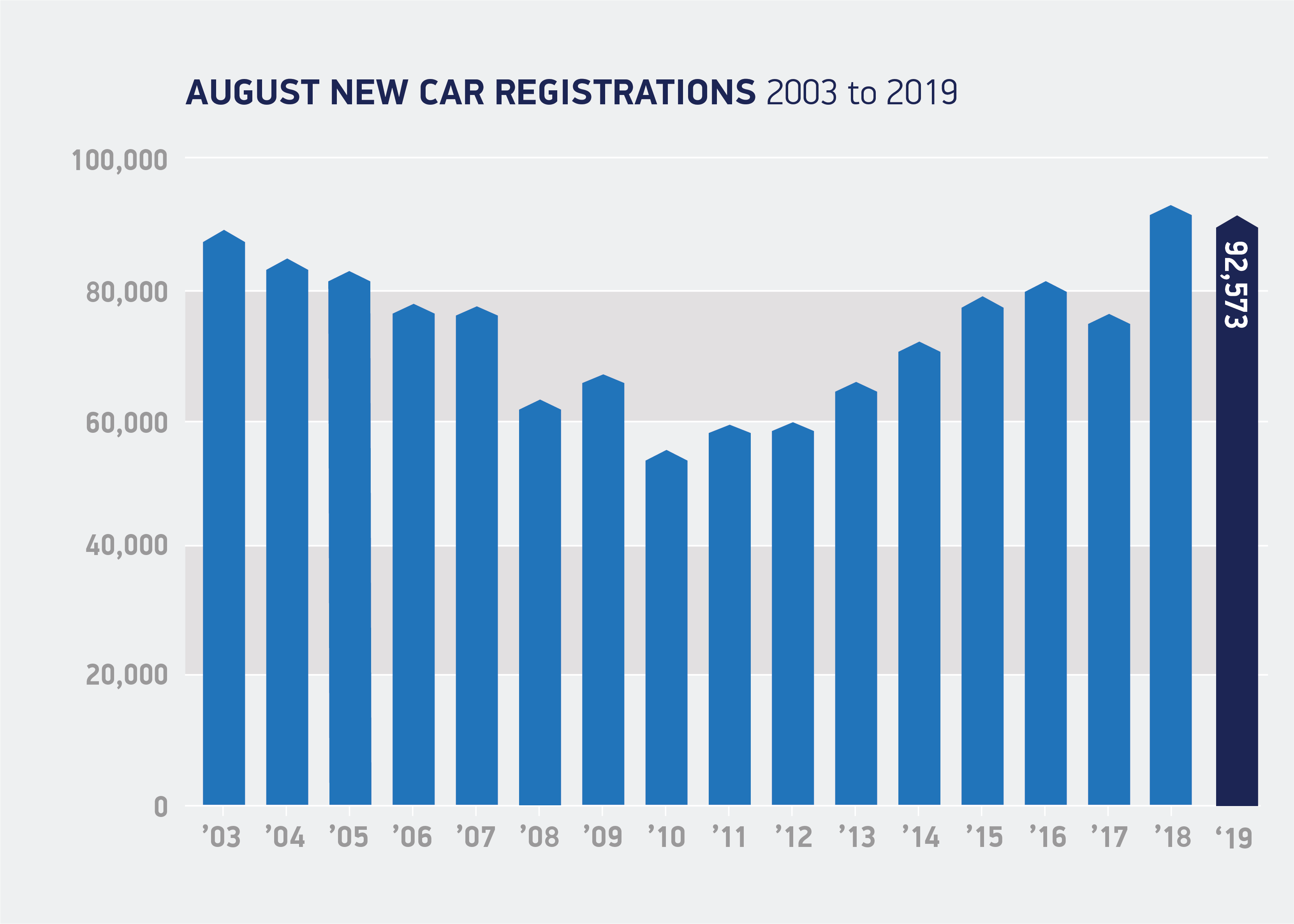Slight fall in August new car sales, but strong showing for electric cars
 (Source: SMMT)
(Source: SMMT)
SMMT figures show that the UK new car market remained steady in August, with just 1,521 fewer cars registered than in the same month last year. Registrations fell by -1.6 per cent in what is typically one of the smallest months of the year, as falling demand for diesel and plug-in hybrid vehicles continued to impact the overall market.
Registrations from both the private and fleet sectors declined in the month, down -1.7 per cent and -3.5 per cent respectively, as demand in the small volume business segment increased by some 962 units.
Meanwhile, diesel registrations fell for the 29th month in a row, though at a slower pace than recently experienced (-12.2 per cent), while petrol demand remained stable, up 1.0 per cent. Zero emission cars saw the biggest percentage growth, up 377.5 per cent, to 3,147 units as new models and some pent up demand boosted registrations, while 4,014 hybrid electric cars also joined UK roads, an uplift of 36.2 per cent. However, the decline in plug-in hybrid registrations continued, down -71.8 per cent to just 907 vehicles.
UK new car buyers can now choose from a huge range of technologies to suit their lifestyles and driving needs. In addition to the cleanest-ever petrols and diesels, the UK’s alternatively fuelled offering now includes some 27 hybrids, 27 plug-in hybrids, and 24 zero emission battery electric and hydrogen models.
Exciting new powertrain technologies, the result of massive manufacturer investment, are now rapidly coming to market – with the range set to almost double over the coming year. However, with demand still lagging behind ambitious government targets, it is clear that much more needs to be done, and quickly, to address consumer concerns over cost and infrastructure to make this emerging technology more accessible.1
Mike Hawes, SMMT chief executive, said, “August is typically the new car market’s quietest month so the huge increase in EV registrations is very visible but especially welcome. It’s great to see consumers respond to the massive industry investment made over many years.
“While this is encouraging, these figures also show the scale of the challenge ahead. It’s a long road to zero and while manufacturers can deliver the technology, they can’t dictate the pace of uptake.
“To support a smooth transition and deliver environmental gains now, we need a long-term government commitment to measures that give consumers confidence to invest in the latest technologies that best suit their needs.”
Minor decline ‘anticipated’: NFDA
Commenting on the figures, Sue Robinson, Director of the National Franchised Dealers Association (NFDA), which represents franchised car and commercial vehicle retailers in the UK, said: ”The minor decline in new car sales was highly anticipated as these figures were against a record August in 2018”
Last year, registrations were unusually high in August, primarily due to the Worldwide Harmonised Light Vehicle Test (WLTP) that came into effect in September and pushed consumers to bring forward their new car purchases. On 1 September 2019, the Real Driving Emission (RDE) regulation came into force to complement WLTP.
Robinson continued, “Although the introduction of the new Real Driving Emission testing from September should not have as strong effects on the market as WLTP last year, especially thanks to the one-year derogation granted by the Government, the market may remain slightly distorted over the next months.
“Positively, sales of pure electric vehicles continued to rise: franchised retailers are making important efforts and investments to meet the fast growing consumer demand for EVs despite supply constraints. There are attractive deals on the market for vehicles of all fuel types, but the current, uncertain political climate undermines consumer confidence.
“NFDA will continue to support franchised retailers during the important plate-change month of September.”




Comments